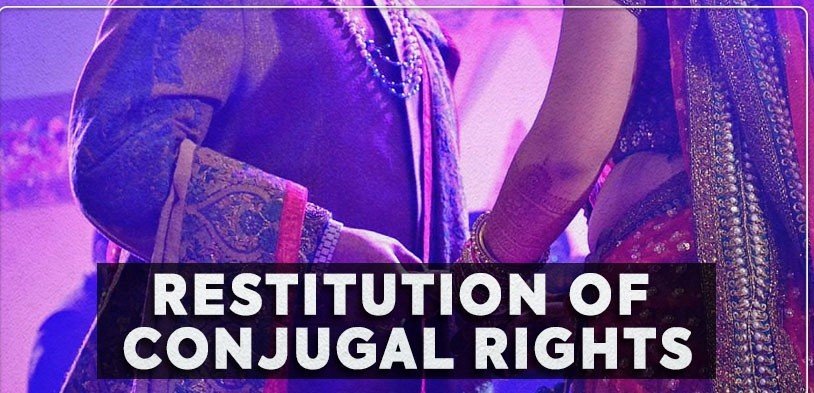- +92 302-6644789
- info@qanoonhouse.com
- Pakistan Legal Advisors, Office No. 5, 2nd Floor, Laraib Plaza, Karachi Company, G-9 Markaz.
Restitution Of Conjugal Rights
RESTITUTION OF CONJUGAL RIGHTS (BAZOO DAWA)
The concept of restitution of conjugal rights refers to a legal remedy available to spouses whose partners have withdrawn from the marital home without reasonable grounds. It is based on the principle of preserving the sanctity of marriage and encouraging the reconciliation and resumption of marital life. The restitution of conjugal rights is recognized in various legal systems, including Pakistan, where it is governed by specific family laws. This legal recourse provides an avenue for aggrieved spouses to seek court intervention in cases where one party has unjustifiably refused to cohabit, aiming to restore the marital relationship.

WHAT ISLAM SAYS ABOUT CONJUGAL RIGHTS
In Islam, conjugal rights hold significant importance within the marital relationship. The Quran and teachings of Prophet Muhammad (peace be upon him) emphasize the fulfillment of these rights. Both spouses have the right to enjoy physical intimacy within the bounds of marriage, promoting love, affection, and companionship. Islam encourages spouses to fulfill each other’s needs, fostering a strong and harmonious marital bond while upholding the principles of modesty, respect, and mutual consent. The Quran contains several ayat’s that highlight the rights and responsibilities of both husbands and wives in Islam. Here are a few ayat’s addressing their rights:
And among His signs is that He created for you mates from among yourselves, that you may dwell in tranquility with them, and He has put love and mercy between your hearts.” (Quran 30:21)
“And they (women) have rights (over their husbands) similar to those (of men) over them in kindness, and men are a degree above them.” (Quran 2:228)
“Men are in charge of women by [right of] what Allah has given one over the other and what they spend [for maintenance] from their wealth.” (Quran 4:34)
“And live with them in kindness. For if you dislike them – perhaps you dislike a thing and Allah makes therein much good.” (Quran 4:19)
“And due to the wives is similar to what is expected of them, according to what is reasonable. But the men have a degree over them [in responsibility and authority].” (Quran 2:228)

These ayat’s emphasize the importance of love, mercy, kindness, and mutual rights and responsibilities between husbands and wives in Islam. They encourage both spouses to treat each other with respect, compassion, and fairness, creating a harmonious and balanced marital relationship.
LEGAL BASIS AND PURPOSE OF RESTITUTION OF CONJUGAL RIGHTS IN PAKISTAN
The restitution of conjugal rights in Pakistan finds its legal basis primarily in the Muslim Family Laws Ordinance, 1961, and the West Pakistan Family Courts Act, 1964. These laws recognize the importance of maintaining the institution of marriage and provide legal recourse for individuals whose spouses have withdrawn from cohabitation without valid grounds. The purpose of the restitution of conjugal rights in Pakistan is to encourage reconciliation and the resumption of marital life. It upholds the belief that marriage is a sacred bond and seeks to address situations where one spouse unjustifiably refuses to cohabit. The legal framework aims to promote the preservation of marriage by providing a legal avenue for spouses to assert their right to marital companionship and harmony.
Legal Services
Our Attorney

Popular Service
Provincial Tax Authorities
Misc. Services
Recent Article
LEGAL FRAMEWORK FOR RESTITUTION OF CONJUGAL RIGHTS IN PAKISTAN
The legal framework for the restitution of conjugal rights in Pakistan is primarily governed by the Muslim Family Laws Ordinance, 1961, and the West Pakistan Family Courts Act, 1964. These laws outline the procedures, grounds, and consequences associated with seeking restitution.
MUSLIM FAMILY LAWS ORDINANCE, 1961
This ordinance applies to Muslims in Pakistan and addresses various aspects of family law, including restitution of conjugal rights. Section 9 of the ordinance provides the legal basis for seeking restitution and outlines the procedures to be followed.
WEST PAKISTAN FAMILY COURTS ACT, 1964
This act establishes family courts in Pakistan and grants them jurisdiction to hear cases related to family matters, including restitution of conjugal rights. Family courts play a vital role in adjudicating restitution petitions and resolving disputes between spouses.
FILING A PETITION FOR RESTITUTION
To initiate the restitution process, the aggrieved spouse must file a petition in the relevant family court. The petition should state the grounds for seeking restitution and provide supporting evidence.
MEDIATION AND RECONCILIATION
Family courts may encourage mediation and reconciliation as part of the restitution process. Trained mediators or counselors may be involved to facilitate dialogue, resolve conflicts, and promote reconciliation between spouses.


COURT PROCEEDINGS AND EVIDENCE
During court proceedings, both parties have the opportunity to present their arguments and provide evidence supporting their claims. The court evaluates the circumstances and reasons for withdrawal from cohabitation to determine the validity of the petition.
DECREE OF RESTITUTION
If the court determines that there are no valid grounds for the withdrawal from cohabitation, it may issue a decree of restitution. The decree orders the defaulting spouse to return and resume marital life within a specified timeframe.
COMPLIANCE AND CONSEQUENCES
If the defaulting spouse fails to comply with the court’s order, the court may enforce the decree through various means, such as fines, imprisonment, or other measures available under the law.
ALTERNATIVES TO RESTITUTION
In cases where reconciliation is not possible or in the best interest of the parties involved, alternatives such as separation, divorce, or judicial separation can be pursued.
GROUNDS FOR SEEKING RESTITUTION OF CONJUGAL RIGHTS
In Pakistan, the restitution of conjugal rights can be sought when one spouse believes that their partner has unjustifiably withdrawn from cohabitation. The following are some common grounds on which an aggrieved spouse may file a petition for restitution:
Unjustified Separation
If one spouse leaves the marital home without reasonable grounds and refuses to cohabit, the other spouse may seek restitution based on the ground of unjustified separation.
Refusal to Fulfill Marital Obligations
If a spouse refuses to fulfill their marital obligations without valid justification, such as withholding conjugal rights or neglecting their responsibilities towards the marriage, the aggrieved spouse may seek restitution.
Abandonment
If one spouse abandons the other without reasonable cause, leaving them in a state of deprivation or neglect, the abandoned spouse may file a restitution petition.
Lack of Financial Support
If a spouse fails to provide financial support to the other without valid reasons, leading to significant hardship or deprivation, the aggrieved spouse may seek restitution.
Mental or Physical Cruelty
If one spouse subjects the other to mental or physical cruelty, rendering cohabitation intolerable or unsafe, the victimized spouse may seek restitution.
Addiction or Substance Abuse
If a spouse’s addiction or substance abuse interferes with the marriage and leads to the breakdown of cohabitation, the affected spouse may file a restitution petition.
It is important to note that the grounds for seeking restitution must be genuine and supported by evidence. Frivolous or malicious petitions may not be entertained by the court. Family courts carefully evaluate the circumstances and reasons for the withdrawal from cohabitation before deciding whether restitution should be granted.


PROCEDURES FOR FILING A PETITION FOR RESTITUTION OF CONJUGAL RIGHTS
In Pakistan, the process of filing a petition for restitution of conjugal rights involves several steps. Here are the general procedures to follow when seeking restitution:
Consultation with an Attorney
Seek legal advice and consult with a qualified family law attorney who specializes in matrimonial matters. They can guide you through the legal process, explain the requirements, and assist you in preparing the necessary documentation.
Drafting the Petition
Work with your attorney to draft a petition for restitution of conjugal rights. The petition should clearly state the grounds on which you are seeking restitution and include relevant details about the marriage, the withdrawal from cohabitation, and any supporting evidence.
Filing the Petition
File the petition at the relevant family court. The court where you should file the petition is determined based on the jurisdiction in which the marriage took place or where you and your spouse last resided together.
Court Fees and Documentation
Pay the applicable court fees and submit the required documents along with the petition. These documents may include copies of your marriage certificate, identification documents, and any other supporting evidence to substantiate your claim.
Notice to the Respondent
The court will issue a notice to the respondent (your spouse) informing them about the petition and the date of the first hearing. The respondent will be given an opportunity to respond and present their arguments.
Attending Court Hearings
Attend the scheduled court hearings along with your attorney. Present your case, provide evidence, and present any witnesses if necessary. Be prepared to answer any questions posed by the court or the respondent’s legal representative.
Mediation and Counseling
The court may encourage mediation or counseling as part of the restitution process. Both parties may be required to participate in sessions aimed at resolving disputes, promoting communication, and exploring possibilities of reconciliation.
Court Decision
After considering the evidence and arguments presented by both parties, the court will make a decision on the restitution petition. The court may grant or deny the restitution request based on the merits of the case.
Decree of Restitution
If the court determines that restitution should be granted, a decree of restitution will be issued. The decree will specify the terms and conditions, including a timeframe for the defaulting spouse to return and resume cohabitation.
Compliance and Further Proceedings
If the defaulting spouse fails to comply with the court’s order, the court may take further action, such as imposing penalties or enforcing the decree through available legal mechanisms.

ROLE OF FAMILY COURTS IN RESTITUTION OF CONJUGAL RIGHTS
Family courts in Pakistan play a vital role in ensuring a fair resolution of disputes arising from the withdrawal from cohabitation. They facilitate legal procedures, evaluate evidence, and provide a platform for spouses to express concerns. Encouraging mediation and counseling, family courts aim to create an environment for open communication and reconciliation. With the authority to issue restitution decrees, they consider the best interests of children and overall circumstances. As neutral arbiters, family courts uphold justice, balance rights, and promote a resolution that serves the spouses and the institution of marriage.
Karachi Office:
M-51, Muneer Mobile Mall, Block 17, Near Perfume Chowk & Jauhar Chowrangi, Gulistan-e-Jauhar.
Islamabad Office:
Pakistan Legal Advisors, Office No. 5, 2nd Floor, Laraib Plaza, Karachi Company, G-9 Markaz.
Lahore Office:
Qanoon Online, 2nd Floor, Al-Mairaj Arcade, Near Surayya Azeem Trust Hospital, Chauburji Chowk.
Copyright © 2023 Design by Digitocrate (Pvt) LTD
